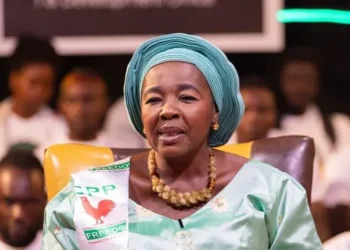In a comprehensive discussion on the recent Supreme Court ruling concerning parliamentary matters, Hon. Vincent Ekow Assafuah Esq., MP for Old Tafo, has reaffirmed the Supreme Court ruling on vacant seats and its implications should Parliament refuse to adhere.
Hon. Assafuah argued that while the Supreme Court ruling did not issue an explicit order to Parliament, the declaration itself is binding, he noted;
“The absence of an order will not make a declaration a white elephant. Put differently, the fact that the Supreme Court did not give an order does not mean that the declaration therein is ineffective.”
Hon. Vincent Ekow Assafuah Esq Former MP for old Tafo
Drawing on legal precedents, he cited a case involving the Electoral Commission, where the absence of consequential orders led to subsequent legal action.
The plaintiffs returned to court to compel compliance with the declaration, emphasizing the judiciary’s capacity to enforce its decisions.
Hon. Assafuah explained that a similar scenario could unfold if Parliament, under the advice of the Speaker, chose not to act on the ruling;
“Even Thaddeus Sory as lawyer to the Speaker of Parliament advises the client that in the judgment, there was no order directed at him, and for that matter, should not act, the plaintiff [Afenyo Markin] can go back to court to seek those orders.”
Hon. Vincent Ekow Assafuah Esq Former MP for old Tafo
Parliamentary Constructs: Majority and Minority Defined
The former MP addressed a critical aspect of the judgment—the relationship between parliamentary constructs and constitutional provisions.
“Majority and minority are not a creation of the Constitution. That is why I was expecting Thaddeus Sory to rather commend the judges for exhibiting their deep understanding of the constitutional arrangement. Because what minority and majority is just a creation or creature of Parliament and not a creature of the Constitution.”
Hon. Vincent Ekow Assafuah Esq Former MP for old Tafo
This distinction, according to Hon. Assafuah, informed the Supreme Court’s decision to refrain from defining or directing Parliament on majority-minority dynamics.
He commended the judges for their understanding of the constitutional framework:
“Any time the Supreme Court, to interpret the constitution, it needs to interpret the constitution in terms of things that are in the constitution and not things that are not in the constitution.’’
Hon. Vincent Ekow Assafuah Esq Former MP for old Tafo
Internal Parliamentary Procedures and Compliance

Hon. Assafuah asserted that the Supreme Court’s declaration implicitly requires the Speaker of Parliament to use internal parliamentary procedures to address the matter.
He further argued that it was unnecessary for the Court to explicitly direct the Speaker, as parliamentary matters fall within the Speaker’s jurisdiction.
On Amending the Case Before the Court
Responding to critiques that the Supreme Court should have considered changes in circumstances after the initial filing, Hon. Assafuah noted the legal principles surrounding amendments.
He acknowledged that the Speaker’s statement, made after the case was filed, did not fundamentally alter the Court’s ability to adjudicate based on the facts initially presented.
The Role of Public Interest in Judicial Declarations
“The Supreme Court had every right under the laws of Ghana to make further declarations or further orders that [were]not sought by the plaintiffs so it is not a legal pretends.’’
Hon. Vincent Ekow Assafuah Esq Former MP for old Tafo
This, he argued, underscores the Court’s responsibility to uphold constitutional supremacy and the public good.
Supremacy and Parliamentary Constitutional Autonomy

Hon. Assafuah concluded by emphasizing the principle of constitutional supremacy in Ghana’s governance structure. He stated;
“The judiciary, legislature, and executive are all subsidiaries to the Constitution of Ghana because we practice constitutional supremacy.”
Hon. Vincent Ekow Assafuah Esq Former MP for old Tafo
This principle, he argued, requires that all branches of government, including Parliament, comply with Supreme Court interpretations of the Constitution.
“The Supreme Court cannot interpret things that are not in the Constitution, such as defining what constitutes a parliamentary majority or minority.”
Hon. Vincent Ekow Assafuah Esq Former MP for old Tafo
Hon. Vincent Ekow Assafuah’s commentary underscores the complexities of balancing parliamentary autonomy with constitutional supremacy.
He lauded the Supreme Court for its nuanced approach while urging Parliament to respect the binding nature of the Court’s declarations.
His analysis offered a roadmap for navigating similar constitutional questions in the future.
READ ALSO; Tiwa Savage Lambasts Wizkid’s Fan Over Music Controversy



















